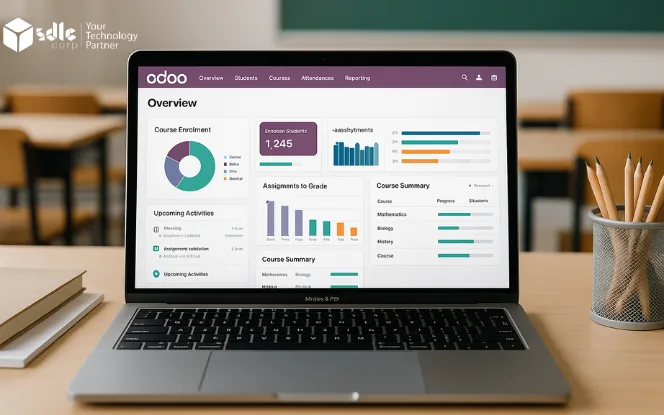1. Introduction
The educational landscape is undergoing a seismic shift. As schools, colleges, and universities navigate the complexities of modern learning—remote education, student engagement, administrative overload—they are increasingly looking for solutions that bring efficiency, transparency, and scalability. Enter Odoo for Education a versatile, open-source ERP that offers a unified platform to manage everything from admissions and faculty to online learning and finance.
In this blog, we’ll explore the role of Odoo in revolutionizing educational institutions, how an Odoo development company can customize solutions to fit institutional needs, and real-world examples that illustrate the transformative power of ERP in education.
2. What is Odoo ERP and Why It Matters for Education?
Odoo is a comprehensive suite of open-source business applications that covers various business needs including CRM, accounting, inventory, HR, and more. When tailored for educational institutions, Odoo ERP for schools becomes a powerful solution that handles:
- Admissions and enrollment
- Course scheduling and curriculum planning
- Student and faculty management
- Attendance and grading
- Fee collection and finance
- Learning Management System (LMS) integration
Odoo’s modular architecture allows educational institutions to choose and configure features based on their specific requirements, ensuring a fully customized ERP experience.
3. Key Benefits of Odoo for Educational Institutions
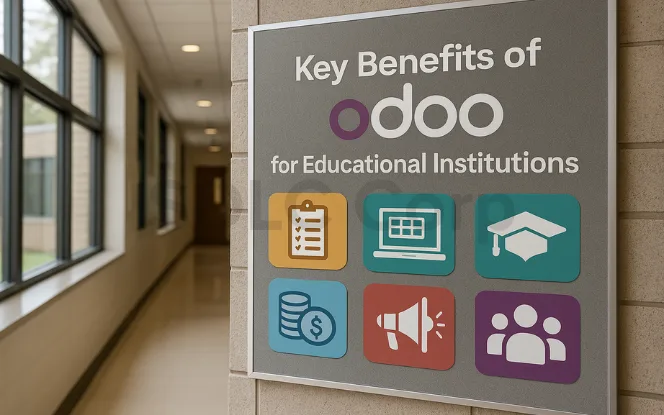
A. Integration and Centralization
Gone are the days of juggling multiple spreadsheets and systems. With Odoo, all student, staff, and operational data is stored and accessed in one centralized platform.
B. Automation of Administrative Tasks
Tasks like issuing ID cards, generating report cards, tracking attendance, and managing payroll can be automated, saving precious time and reducing human errors.
C. Enhanced Learning Experience
With built-in LMS features or seamless integration with platforms like Moodle, Odoo helps in managing course materials, assessments, and virtual classrooms effectively.
D. Custom Dashboards & Reporting
Stakeholders from principals to parents can access custom dashboards to track student progress, financials, and institutional KPIs in real-time.
E. Scalability
Whether it’s a single-campus school or a multi-institution university system, Odoo scales to support any size, making it ideal for both small schools and large educational ecosystems.
4. Real-World Case Study

Here are a few clear examples of how oddo improves real-world education operations, framed in the context of an Odoo-like ERP system.
A. All Saints University School of Medicine
Situation: Manual administrative processes, fragmented student records, inefficient communication between departments.
Solution: Adoption of Odoo ERP for education to digitize admissions, student records, and faculty coordination.
Business Outcome: 40% reduction in administrative overhead. Enhanced student satisfaction with transparent grading and course tracking. Improved compliance reporting for accreditation.
B. OpenClassrooms: Revolutionizing Online Education with Odoo
Situation: OpenClassrooms is a French-based online education platform serving over 300,000 students, OpenClassrooms needed a powerful backend system to scale its growing e-learning operations.
Solution: By deploying a custom Odoo ERP, OpenClassrooms unified its CRM, accounting, learning content management, and HR functions under one umbrella.
Business Outcome: 50% reduction in operational overhead. Improved learner onboarding and certification issuance. Enhanced course delivery speeds and student satisfaction
5. How an Odoo Development Company Can Help
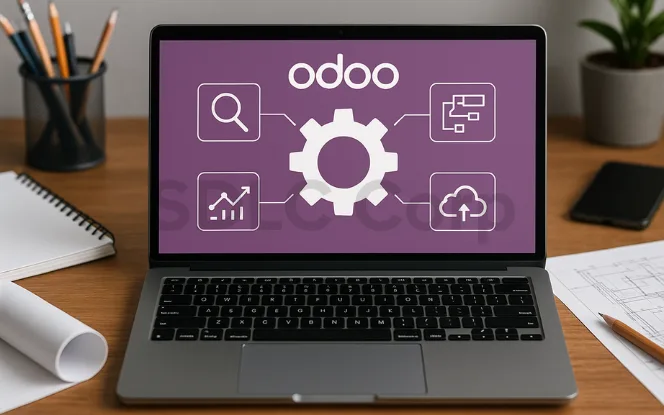
Implementing an ERP system is not just about installing software—it requires deep domain knowledge, customization, and ongoing support. A professional Odoo development company can:
- Analyze institutional workflows
- Configure and deploy the right modules
- Customize reports and interfaces
- Provide LMS and third-party integrations
- Train staff and offer technical support
Choosing the right development partner ensures a successful ERP journey and maximizes ROI for your educational institution.
6. Key Modules in Odoo for Education
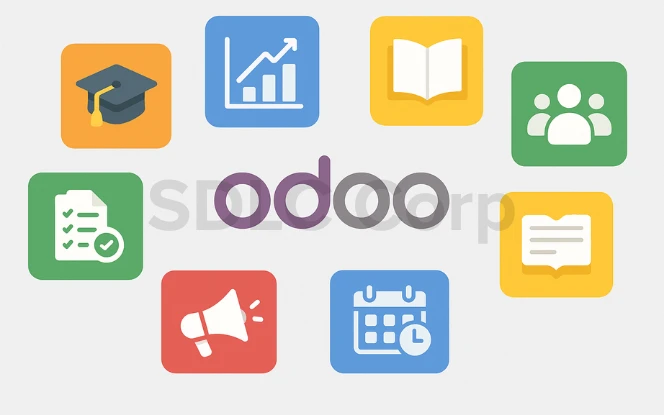
A. Student Management
Maintain complete records of students—personal details, academic history, attendance, disciplinary records, and health information.
B. Faculty & HR Management
Manage recruitment, contracts, payroll, performance evaluations, and leave tracking for educators and staff.
C. Course and Timetable Scheduling
Automate semester-wise scheduling, classroom allocations, and exam setups. This will help synchronize the subjects and the semester.
D. Accounting and Finance
Track tuition fees, generate invoices, manage scholarships, and handle financial reporting with precision.
E. Library Management
Oversee book circulation, availability tracking, and digital resource management.
7. Odoo ERP Implementation Process for Educational Institutions
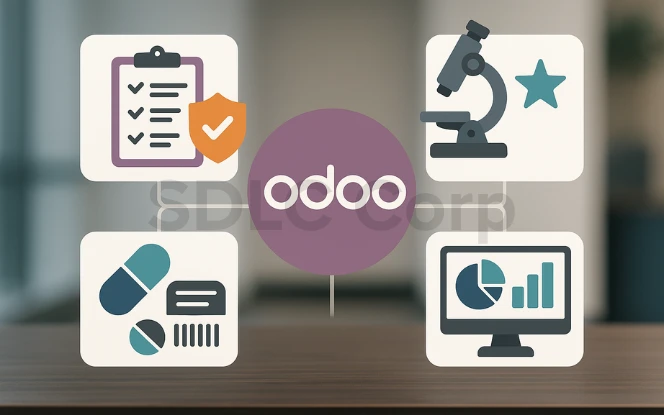
Successfully deploying Odoo for Education requires a structured, step-by-step approach to ensure all institutional needs are met while minimizing disruption to existing operations. Here’s a typical roadmap followed by a professional Odoo development company when implementing an educational ERP:
A. Requirement Gathering
This foundational phase involves collaborative discussions with school or university stakeholders—including administrators, faculty, and IT teams. The goal is to understand the institution’s specific workflows, challenges, and compliance needs.
Documentation of functional and technical requirements
Identification of legacy systems for migration
Selection of necessary Odoo modules
B. Customization
Odoo’s modular architecture allows for deep customization. Based on the requirements gathered, developers tailor the system to align with institutional policies, course structures, reporting formats, and student engagement models.
Role-based user access levels
Integration with LMS or legacy platforms
Tailored grading, fee, and attendance structures
C. Training
Once the customized ERP is ready, training becomes essential. Faculty, administrative staff, and technical teams receive role-specific instruction through workshops, manuals, or video tutorials.
Module navigation and dashboards
Report generation and record updates
User management and escalation handling
D. Rollout
The ERP system is deployed either in stages (pilot testing by department) or via a full-scale launch across the institution. This phase includes data migration, final testing, and go-live validation.
Migration of student/staff records
Real-time testing of workflows
Final system audit and deployment
E. Ongoing Support
Post-deployment, institutions benefit from regular support to ensure smooth operations. The Odoo development company often provides bug fixes, upgrades, compliance adjustments, and help desk services.
Technical maintenance and uptime assurance
Adding new features as the institution grows
Timely troubleshooting and SLA-based resolution
8. Data Privacy, Compliance & Security in Odoo for Education
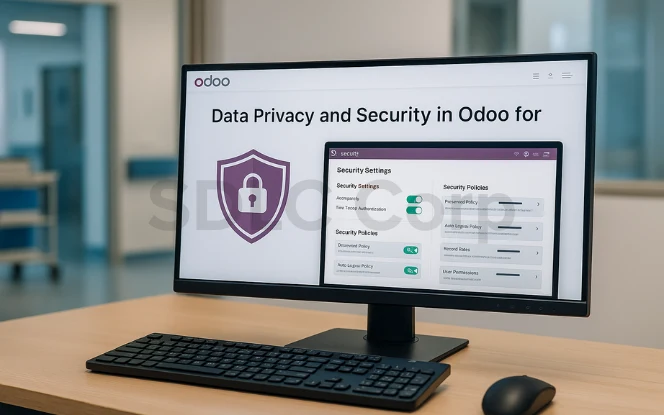
When educational institutions adopt ERP systems, data privacy and security are non-negotiable. Managing sensitive information such as student records, health data, grades, and financial details demands robust controls, compliance readiness, and transparency. Fortunately, Odoo for Education is equipped with a comprehensive suite of features designed to protect institutional data and ensure regulatory compliance.
A. Role-Based User Access Control
Odoo enables granular role-based permissions, ensuring that users access only the information relevant to their roles.
Teachers can access student grades and course materials
Finance staff manage only fee-related modules
Students and parents have limited dashboard access based on profile
This architecture minimizes the risk of internal data breaches and ensures clarity in data ownership.
B. Audit Logs and System Monitoring
To enhance transparency and accountability, Odoo maintains detailed audit logs.
Every action—such as data modification, login attempts, or module changes—is recorded
Administrators can track activity history and detect anomalies in real-time
These logs are invaluable during audits, investigations, and compliance reviews.
C. GDPR Readiness and Global Compliance
For institutions operating in or with students from the EU, GDPR compliance is critical.
Odoo provides:
Consent management options for data collection
Easy data export, modification, and deletion capabilities
Pseudonymization and privacy-by-design principles
This positions Odoo as a globally compliant ERP platform capable of supporting regional laws such as FERPA (U.S.), PIPEDA (Canada), and GDPR (EU).
D. Data Encryption and Secure Hosting
Odoo supports HTTPS encryption, ensuring data in transit is protected. When hosted on-premise or via a cloud provider, institutions can enforce:
AES encryption for sensitive data at rest
Regular security patches and system updates
Two-factor authentication (2FA) for admin accounts
Moreover, Odoo’s infrastructure is designed to be scalable and secure, whether deployed in private servers or trusted cloud environments like AWS or Odoo.sh.
9.Security in Modular ERP Setup
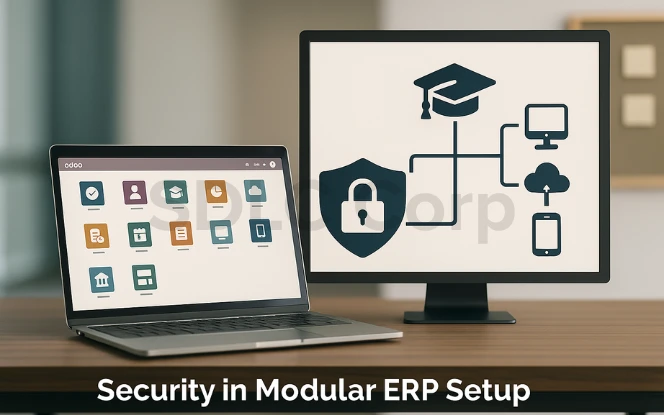
Odoo’s modular design allows educational institutions to deploy specific apps like Student Management, HR, Finance, or LMS integration independently. However, this flexibility can pose security challenges if roles and access controls aren’t managed properly.
Best Practices for ERP Security in Education:
Role-Based Access Controls (RBAC): Ensure students, teachers, finance teams, and administrators have appropriate, isolated access.
Secure Module Communication: If modules such as Accounting and Student Records interact, enforce internal API authentication and logging.
Two-Factor Authentication: Especially critical for administrative and data-sensitive user roles.
Audit Trails: Enable system-wide logging for activities such as report card changes, fee adjustments, or account deletions.
Partnering with an experienced company helps institutions design ERP security from the ground up, minimizing the risk of internal data leaks or unauthorized system usage.
10. Data Migration Challenges

Migrating from traditional or legacy systems to Odoo can be complex—especially for institutions with years of fragmented or inconsistent data.
Common Challenges in Educational Data Migration:
Unstructured Data: Records in formats like PDFs, Excel sheets, or even paper forms require cleaning and normalization.
Inconsistent Naming Conventions: Variations in student IDs, course codes, or department labels can hinder automation.
Data Loss Risk: Improper migration methods may lead to missing academic history, fee records, or compliance files.
11. Future of Education with Odoo
The future is digital, and Odoo is actively evolving to meet the demands of AI in education, predictive analytics, and personalized learning journeys. Imagine a future where:
- AI tracks student performance trends and recommends interventions
- Administrators automate predictive enrollment forecasting
- Students receive real-time feedback via integrated learning modules
With an agile Odoo development services, these possibilities are no longer futuristic—they are achievable today.
Conclusion
The education sector is in dire need of digital transformation, and Odoo for Education emerges as a powerful enabler. From automation and scalability to personalization and real-time insights, Odoo empowers educational institutions to deliver better learning experiences while managing their operations efficiently.
Partnering with an experienced Odoo development company ensures your institution can unlock the full potential of this ERP platform—transforming challenges into opportunities for growth, innovation, and excellence.
FAQ's
What kind of training is provided for staff and educators using Odoo ERP?
Most Odoo development companies offer onboarding workshops, documentation, and hands-on training sessions for administrative staff, faculty, and IT teams. Some providers also offer continuous training and support plans to help users adapt to upgrades and newly added modules.
Can Odoo for Education support multi-language and multi-campus institutions?
Yes, Odoo is designed with internationalization in mind. It supports multiple languages and can be configured to manage multiple campuses or branches under a centralized database, making it ideal for educational groups operating across regions or countries.
Does Odoo for Education provide mobile access for students and faculty?
Yes, Odoo has a responsive web interface and native mobile apps that allow students, teachers, and administrators to access key modules such as grades, schedules, assignments, and communication tools from their smartphones or tablets.
How can an Odoo development company assist in customizing ERP for education?
An Odoo development company can tailor modules, create custom reports, integrate third-party apps, and offer training to ensure the ERP system aligns with your institution’s specific requirements.
What are the costs involved in implementing Odoo for Education?
While the Odoo software is open-source, implementation costs depend on the scope, customization, and support services provided by the development partner. However, it is generally more cost-effective than proprietary ERP systems.

